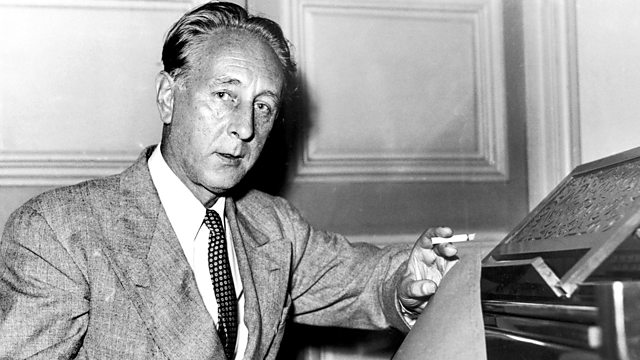
La vie parisienne
Donald Macleod explains how the artistic hothouse of 1920s Paris was reflected in Martinu's music, including La revue de cuisine.
Donald Macleod finds the artistic hothouse of 1920s Paris reflected in Martinu's music, including Martinu's tale of love among the kitchen utensils, La revue de cuisine.
Caught up in the events of the Second World War, Bohuslav Martinu spent the majority of his life living in exile. When he was born in 1890, the little town of Policka was still part of the Austro-Hungarian Empire. A period of independence for Czechoslovakia came to an end when, in 1938, Hitler annexed part of the country to Germany. By the time of Martinu's death in 1959, he was living in Switzerland, where he was receiving treatment for cancer and the Communists had assumed power in his homeland. Yet, despite his protracted absence, Martinu remained spiritually attached to his homeland and readily acknowledged the influence of its music. But equally, as we'll hear across this week, Martinu's music expresses a rich diversity of styles. From his years spent in Paris there are works informed by the popularity of jazz and by Debussy and Stravinsky in the swinging 1920s. When he moved to the United States he turned to symphonic writing. On his return to Europe, he was drawn to Renaissance Art and produced chamber music, basking in the warmth of Nice as well as turning to the poetry of his beloved homeland. Drawing on all these experiences, Martinu was a prolific composer who worked ceaselessly at his craft. He produced a treasury of more than four hundred works across every conceivable form and instrumentation, which reflect not only his roots but his thirst for novelty and inspiration.
Having fallen in love with Paris while touring with the Czech Philharmonic as a violinist, in his twenties Martinu moved there on a permanent basis. The result was a proliferation of music which draws on the cross-fertilisation of culture he experienced around him. Presented by Donald Macleod.
Who is the most powerful in the World? (excerpt)
Prague Symphony Orchestra
Jiri Belohlavek, conductor
Butterflies and Birds of Paradise (excerpt)
Emil Leichner, piano
Revue de cuisine
Bohumil Kotmel, violin
Frantisek Host, cello
Tomas Kopacek, clarinet
Frantisek Herman, bassoon
Jaroslav Halir, trumpet
Daniel Wiesner, piano
String Quartet No. 3
Doric String Quartet
La Bagarre
Brno State Philharmonic
Petr Vronsky, conductor.
Last on
Music Played
-
![]()
Bohuslav Martinů
Veselohra na moste (Comedy on a bridge)
Orchestra: Prague S O. Conductor: Jiří Bělohlávek.- Supraphon: CO-73328.
- Supraphon.
- 1.
-
![]()
Bohuslav Martinů
Butterflies and birds of paradise
Performer: Emil Leichner.- Supraphon: 1110102.
- Supraphon.
- 2.
-
![]()
Bohuslav Martinů
Butterflies and birds of paradise - Butterflies in flowers
Performer: Emil Leichner.- Supraphon: 1110102.
- Supraphon.
- 2.
-
![]()
Bohuslav Martinů
Kitchen revue
Performer: František Host. Performer: František Herman.- Supraphon: SU37492.
- Supraphon.
- 6.
-
![]()
Bohuslav Martinů
String Quartet no 3
Ensemble: Doric String Quartet.- Chandos: CHAN 10848.
- Chandos.
- 9.
-
![]()
Bohuslav Martinů
La Bagarre
Performer: Brno Philharmonic Orchestra. Conductor: Petr Vronský.- SUPRAPHON : SU-3058-2 011.
- SUPRAPHON.
- 17.
Broadcasts
- Tue 11 Oct 2016 12:00���˿��� Radio 3
- Tue 11 Oct 2016 18:30���˿��� Radio 3
Beethoven Unleashed – the box set
What was really wrong with Beethoven?
Composers A to Z
Who knew? Five eye-opening stories from Composer of the Week
Five reasons why we love Parry's Jerusalem
What is the strange power of Jerusalem which makes strong men weep?
A man out of time – why Parry's music and ideas were at odds with his image...
The composer of Jerusalem was very far from the conservative figure his image suggests.
Composer Help Page
Find resources and contacts for composers from within the classical music industry.





